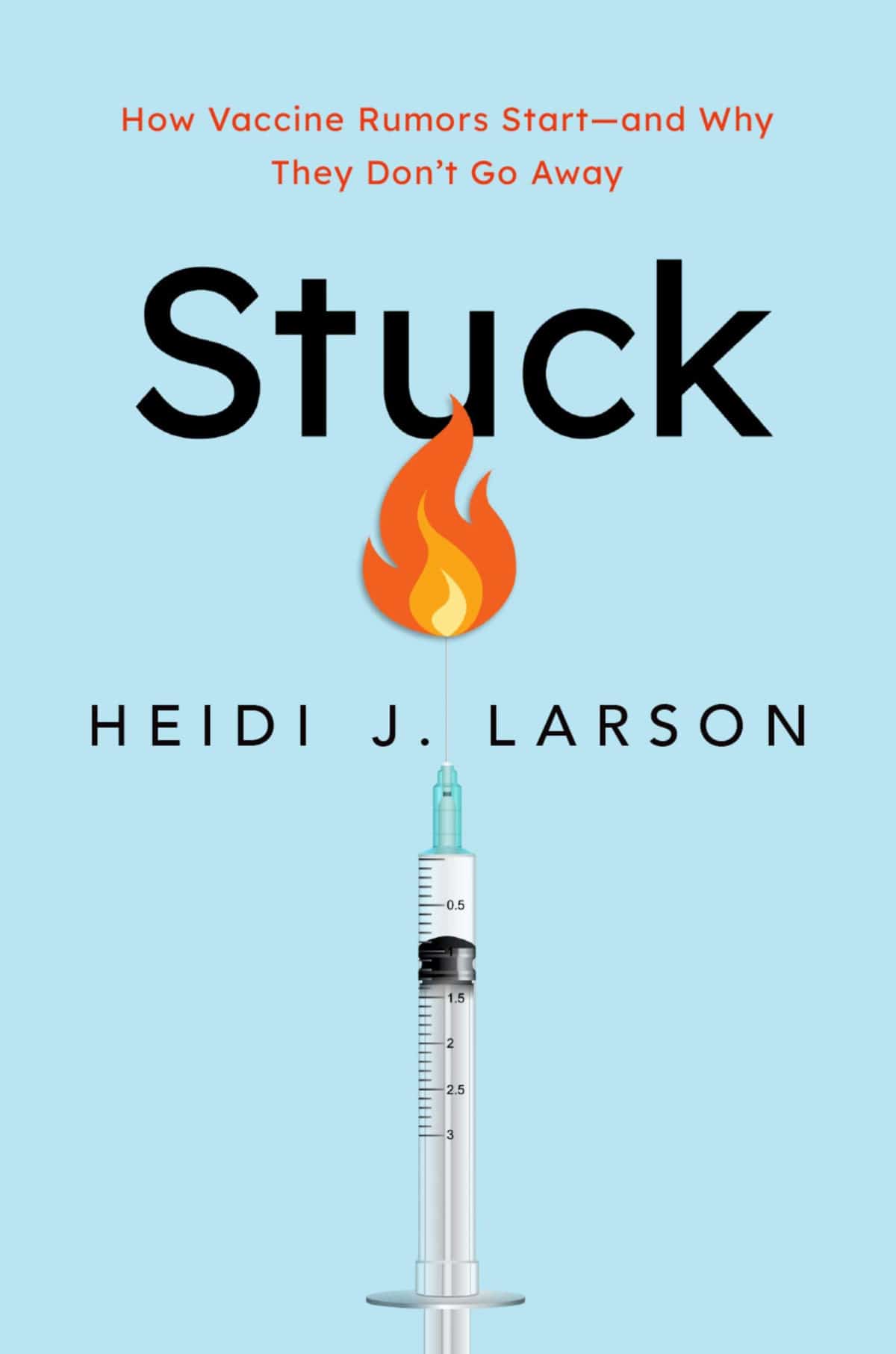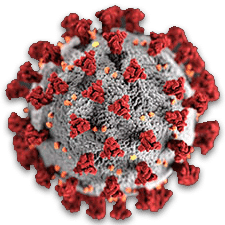Interview: Risk Expert Heidi J. Larson on Vaccine Hesitancy
Experts have long pointed to mass vaccination as the key to bringing the Covid-19 pandemic under control. And while the percentage of Americans who have been vaccinated is steadily rising, many are still reluctant. A survey released last week indicated that 22 percent of Americans will “definitely” or “probably” choose not to get vaccinated. Because of this lingering hesitancy, many experts believe that the U.S. may never reach herd immunity, when enough people have been inoculated to keep the spread of the disease under control.
The reasons why people choose not to get vaccinated are complex and vary from person to person, from community to community, and from country to country. At the far end of the spectrum are the out-and-out “anti-vaxxers,” who mistakenly believe that vaccines cause harm. (An essay published in Nature in April estimates that the movement may have 58 million followers on social media.) But there are also many people who are merely “vaccine hesitant,” including many in marginalized communities.

“Stuck: How Vaccine Rumors Start — and Why They Don’t Go Away,” by Heidi J. Larson (Oxford University Press, 200 pages).
While there is no one-size-fits-all approach to combatting vaccine hesitancy, the better we understand the social, economic, and political forces that underlie it, the better we’re able to find solutions, says Heidi J. Larson, director of the Vaccine Confidence Project and a professor of anthropology, risk, and decision science at the London School of Hygiene and Tropical Medicine. She is also the author of the 2020 book “Stuck: How Vaccine Rumors Start — and Why They Don’t Go Away”.
This interview with Larson has been edited for length and clarity.
Undark: What exactly is vaccine hesitancy, and how are the vaccine-hesitant different from so-called “anti-vaxxers”?
Heidi J. Larson: For people who are vaccine hesitant, it doesn’t mean they’re against vaccines. In fact, they may be accepting of most vaccines, but are hesitant about one. Or they’re hesitant about an ingredient in one of them. Or they took something before, but they don’t want to take the second one; or they’re not sure about it. So it’s perfectly reasonable to be hesitant, particularly if you’re a first-time mother, for example, and there’s umpteen different vaccines, and combinations of vaccines — it’s not unreasonable for people to have questions.
I think one thing that’s really exacerbated the polarization around perceptions and confidence in vaccines is that this group of people, who are hesitant, who have been judged and put in the same bucket as those who are “anti-vaccine” because they’re not lining up with the truth. And it’s important to note this distinction, because we need to build that bridge back. Because we’re losing people from our public health goal of getting herd immunity.
UD: What factors lead a person, or a group of people, to be vaccine hesitant?
HL: Usually the primary reason involves some aspect of the vaccine’s safety. But it’s not only safety. Sometimes people say it’s about safety, but really it’s about other issues that they don’t feel will sound acceptable to the medical community. So they say it’s safety, but actually it may not line up with their lifestyle: It could be religious; it could be philosophical. There’s a growing group of young mothers who are very pro-nature — not just about vaccines, but home birth; vegan and gluten-free [foods]; no more contraception, just use the rhythm method.
I’ve seen this in different parts of the world. It’s more a question of a values and lifestyle or life-choice options. That’s a hard one, because it’s not just about the vaccine; it’s about something bigger. It’s like telling someone that they can’t follow their religion: they have to follow “ours” — “ours” being the public health community. So that’s a tense one. I recognize that we’ve done a bad job in scientific community, in terms of communicating that, actually, vaccines trigger your natural immune system. It’s supporting your immune system to be more efficient.
And then there’s the issue of liberty and freedoms and choice. And that’s a deep one that goes back to the first anti-vaccine movement, at the time of the first smallpox vaccine [in the late 18th century].
 |
For all of Undark’s coverage of the global Covid-19 pandemic, please visit our extensive coronavirus archive. |
UD: In the United States, it’s been widely reported that minority communities have been disproportionately affected by Covid-19 — and there also seems to be more vaccine hesitancy in certain communities than in the general population. What are some of the factors behind that?
HL: A major lever of confidence-versus-hesitancy is trust. As we’ve seen in the U.S. with some minority communities, there can be deep distrust, because of historical experiences that are big in the minds of the community. There can also be individual distrust, because an individual had a bad experience, they felt like they weren’t being treated well, or they never get any normal services. Why should they comply now, just because it’s good for other people? They’ve always been left out, they may feel resentment.
There are multiple levels of trust. There’s the issue of trust in the vaccine; whether it will work and be safe. There’s trust in the health care provider. There’s trust in the system, in services. And then trust in the government — in the politics that regulates, requires, and sometimes mandates vaccines. If you don’t trust the government, why should you do what they say?
UD: It sounds like many different approaches may be needed.
HL: I’d call it the “menu” approach. You really need to fit the strategy to the situation. One of the problems is that we’ve often made assumptions about what people are thinking or feeling, without actually talking to them, or asking them. We assume, “Oh they just don’t have the information” – but it’s not about the information, actually.
UD: So we need to do more than bombard people with links to websites that explain how vaccines work …
HL: Actually that may annoy people. They’re telling you how they feel, and you’re throwing facts at them. And that’s not their issue.
UD: What about politics? Many observers have noted the politicization of vaccines, particularly in the U.S.
It gets back to the values issue. And loyalty to previous leaders. We’ve seen this in other countries: If you’re loyal to one party that happens to be the governing one, you follow what they say. And if you don’t support the governing party, then you don’t want their vaccines. You can see there’s been such a distinct difference between the previous administration and this one [in the U.S.] in terms of the Covid response. And half the population, as we know, is still very loyal to the other side. And because it’s not playing out in the White House right now, the public is playing it out in a different way — and that’s through vaccines.
We’ve seen this in other countries, too, where people resent the new administration, or new leader, who was not the one they chose — so why should they try to make him or her look good? And one could say, “it’s against their own interests,” but their values, their belief system, is bigger [than that]. They’ll compromise their health for that.
UD: What do you see as the most promising way forward?
HL: What I’ve seen in the most effective examples, things that have really turned communities around — and we’ve seen this globally, in the polio eradication program — is that it really comes down to local ownership of the response. For example, the Black Coalition Against Covid has been amazing. They’ve mobilized groups of Black doctors and community leaders from some of the communities that were more resistant and distrusting of the vaccine, and taken a 65 percent refusal rate down to 35 percent. It’s not zero, but it’s cut it almost in half.
And in some of the Native American communities, when they see that their heritage is pegged on their elders, and their elders are most at risk — it has meaning to them — they want to keep those elders alive, because it has to do with their cultural survival. So I think when things get translated and understood within communities that have been questioning vaccines — when it’s understood and communicated on their own terms, by people they trust — it really is a change-maker.











Comments are automatically closed one year after article publication. Archived comments are below.
Here’s another good example of why people distrust public health and pharmaceutical entities. It’s not about being emotional, as Dr. Larson implies, it is about being educated enough to understand the issue is a complicated one. Pasting a quote from the story and then the link. Will stop overcommenting now!
“Safety is not an absolute. Like drugs, vaccines are a varied lot, each with its own set of risks and benefits that relate to its particular use in particular individuals. And unfortunately, our knowledge about side effects is often woefully incomplete. To Lemmens, the University of Toronto bioethicist, the reluctance to have a frank discussion about the safety of Gardasil is counterproductive. “We do a disservice to science, and we play into the hand of the anti-vaxxers, if we’re not publicly discussing potential problems,” he told me.
https://slate.com/health-and-science/2017/12/flaws-in-the-clinical-trials-for-gardasil-made-it-harder-to-properly-assess-safety.html
Glad the point was made about minority trust in public health organizations — might have mentioned this isn’t just about rude doctors, it’s about things like the HeLa cells and the Tuskegee experiments.
And regarding credibility, anyone past 1965 who still refers to “the rhythm method” has lost it completely. Billings, natural family planning, sympto-thermal fertility awareness have been around for decades — yes, it’s harder to make a joke about the seventh kid being named NFP. . . .
“who mistakenly believe that vaccines cause harm”
It’s demonstrably not mistaken to believe that some vaccines cause harm — Pandemrix, the rotavirus vaccine that caused intestinal blockage in toddlers (both removed from the market), the Cutter vaccine.
If the people who want higher vaccination rates are not honest about the undisputed facts of vaccination then they lose trust, and then no one believes their other assertions. It’s a bit like a reverse boy who cried wolf. I’ll never understand why public health advocates can’t simply acknowledge that nothing you use — nothing — is only good or bad, that vaccines have risks and sometimes errors, but on balance they are usually good for individuals and have historically been good for populations. If you insist vaccines are nothing but good, you trigger everyone’s BS radar and undermine your credibility.
I believe that a lot of the “hesitancy” is because COVID-19 is a very treatable disease. We know many, many ways to treat it now. For the most part, it only kills those with weakened immune systems, who are over the age of 70. The survival rate is tremendous for most people. So why take an experimental vaccine?
COVID has twice the death rate of flu. That means that as no one had natural immunity we were looking at 700,000 deaths in America in a few months. We are at 600,000, so vaccines won’t “save” that many lives.
The protocols slowed the spread so we didn’t have a huge surge of deaths and disruption in our economic and political systems — that many deaths at once would have meant food shortages, maybe military readiness issues, things that matter to us all. So the idea is that we need to vaccinate to prevent a public health, population-based problem, but we already dodged that problem.
For individuals, it usually only makes sense because it allows people to return to a life without protocols like masking or disruptive work practices. So, yes, for individuals vaccines don’t always make sense, and they really only make sense because of the situation, not the virus itself. And for the entire population, we don’t really “need” herd immunity since we have had most of our deaths already. If public agencies want people to vaccinate under these circumstances, they need to recognize that reality and come up with new and genuine reasons for individuals to vaccinate, not propaganda.